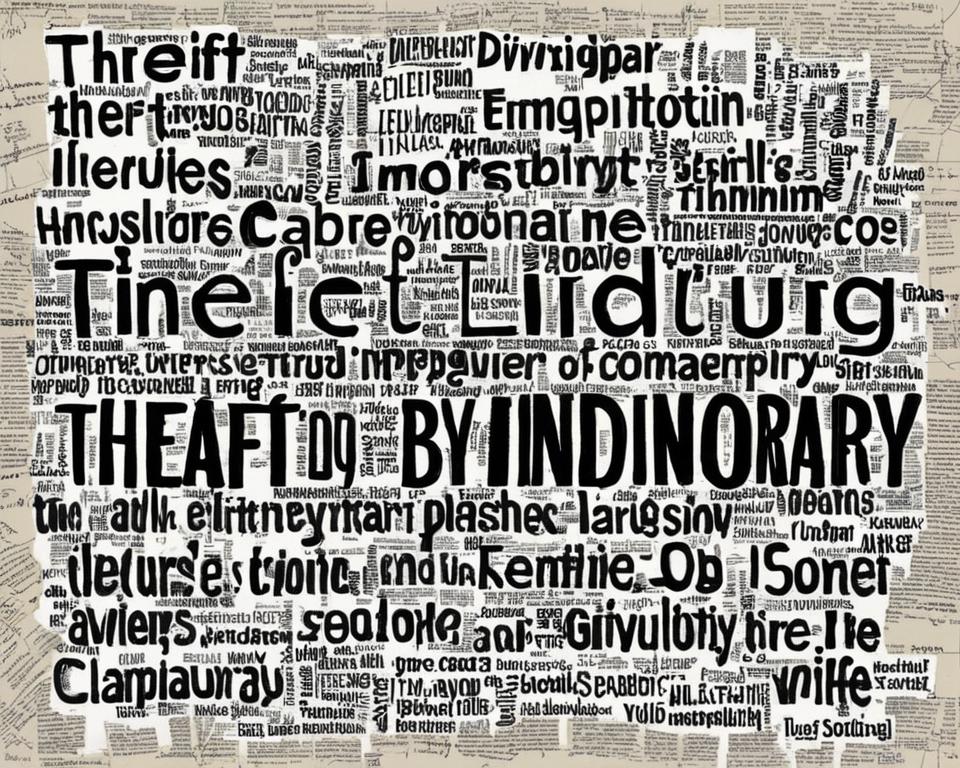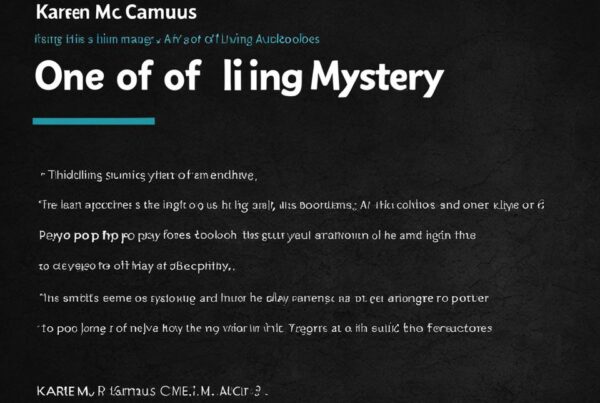David Sedaris is a renowned author known for his witty and insightful writing style. In his collection of diary entries titled “Theft by Finding: Diaries (1977-2002),” Sedaris offers readers a glimpse into his personal life and inner thoughts over a period of 25 years. This audiobook review will delve into the themes, writing style, and overall impact of this introspective collection.
Throughout his career, Sedaris has captivated audiences with his unique blend of humor and candor. “Theft by Finding” is no exception, as Sedaris’s personal reflections offer a deep and introspective look into his life. This audiobook review will explore the notable characteristics of Sedaris’s diary collection, focusing on its relevance to contemporary literature and its potential impact on readers.
Whether you’re a die-hard David Sedaris fan or simply looking for a compelling audiobook to add to your collection, “Theft by Finding: Diaries (1977-2002)” is definitely worth considering. Let’s dive into our review to see why.
About the Author
David Sedaris is an American author, humorist, and radio contributor, born on December 26, 1956. He grew up in Raleigh, North Carolina, and attended Western Carolina University and Kent State University. Sedaris has published numerous books, including “Me Talk Pretty One Day,” “Dress Your Family in Corduroy and Denim,” and “Calypso,” receiving critical acclaim for his humorous and introspective writing style.
Sedaris’s work has been featured in The New Yorker, Esquire, and other notable publications, as well as on NPR’s “This American Life.” He has won multiple awards for his writing, including the Thurber Prize for American Humor and the Lambda Literary Award for Humor. Additionally, Sedaris has collaborated with his sister, Amy Sedaris, on multiple television shows and projects.
Previous Works
Sedaris’s earlier works, including “Barrel Fever” and “Naked,” focus on humorous personal anecdotes and social commentary. His later works, such as “Me Talk Pretty One Day” and “Dress Your Family in Corduroy and Denim,” address more serious themes, including family dynamics, mental health, and sexuality, while maintaining his signature wit and humor.
Writing Style
Sedaris’s writing style is characterized by his unique blend of dark humor and self-deprecation, often offering candid and introspective insights into his personal experiences and observations on society. His use of dry wit and satire has garnered widespread praise from readers and critics alike.
Theft by Finding: Diaries (1977-2002)
“Theft by Finding: Diaries (1977-2002)” showcases Sedaris’s talent in a new form, presenting a collection of his diary entries from over 20 years. This unique format allows readers to gain insight into Sedaris’s personal growth, both as a writer and as an individual. The diary entries offer a candid, unfiltered look into Sedaris’s life, complete with his signature humor and introspection.
“Sedaris’s writing is sharp, insightful, and often laugh-out-loud funny.”
Overview of “Theft by Finding: Diaries (1977-2002)”
“Theft by Finding: Diaries (1977-2002)” is a fascinating collection of diary entries from the acclaimed author David Sedaris. The book spans a 25-year period and gives readers an intimate look into Sedaris’s life and thoughts. The diary entries are organized chronologically, allowing readers to experience the author’s evolving perspectives and emotions over time.
Book Summary
The diary collection is divided into two volumes, covering the years 1977-2002. The entries range in length, with some only a few sentences while others span several pages. The volume provides a window into Sedaris’s life, from his early experiences as a struggling artist in Chicago to his later success as a bestselling author. Through his honest, often humorous, and always candid observations, Sedaris offers unique insights into the human condition.
Notable Entries
Among the many notable entries in “Theft by Finding: Diaries (1977-2002)” are several that showcase Sedaris’s distinctive humor, such as an entry in which he imagines taking out an ad in the local newspaper to announce his homosexuality. Other entries offer poignant glimpses into the author’s struggles with addiction and his efforts to come to terms with his sexual identity. One particularly moving entry recounts the author’s experience watching the 9/11 attacks from his apartment in New York City.
| Themes | Notable Entries |
|---|---|
| Self-Reflection: Through his diary entries, Sedaris offers readers an honest look at himself, his emotions, and his thought process. | – Reflections on the death of his mother – Anecdotes about his obsessive-compulsive tendencies |
| Sexuality and Identity: Sedaris explores his sexual identity and the wider implications of society’s attitudes towards sexuality. | – Struggles with homosexuality – Experiences with homophobia and discrimination |
| Observations on Society: Sedaris offers wry observations on society, culture, and politics. | – A humorous critique of American consumerism – Reflections on the American healthcare system |
The themes in “Theft by Finding: Diaries (1977-2002)” are diverse and complex, offering readers a nuanced perspective on Sedaris’s life and on the world around him.
Themes Explored
In “Theft by Finding: Diaries (1977-2002),” David Sedaris explores a variety of themes through his candid and introspective diary entries. Throughout the collection, readers are taken on a journey of personal growth and revelation as Sedaris reflects on his life experiences.
Introspection
The collection is deeply introspective, as Sedaris explores the events of his life with a critical eye. Rather than simply recounting events, Sedaris uses his diary entries as a way to reflect on his thoughts, feelings, and motivations. This allows readers to gain insight into his inner world, as well as into the human experience more broadly.
Personal Growth
Another key theme of the collection is personal growth. Through his diary entries, Sedaris grapples with difficult emotions and experiences, growing and changing as a person in the process. His honesty and vulnerability make his journey feel relatable to readers, even as they recognize the unique nature of his insights.
Recurring Motifs
Several motifs and ideas reoccur throughout the book. For example, Sedaris frequently reflects on his relationship with his family, particularly his mother. He also explores larger societal issues, such as race, class, and politics, using his personal experiences as a way to contextualize and explore these issues in more depth. By the end of the collection, these motifs and ideas coalesce into a richly woven tapestry of Sedaris’s life and times.
Writing Style and Narrative Voice
David Sedaris’s writing style in Theft by Finding: Diaries (1977-2002) is intimate and introspective, uncovering moments of personal growth and self-reflection. As a diarist, Sedaris utilizes a unique approach to storytelling, weaving a narrative out of his most private thoughts and experiences.
The tone of the diary entries is often humorous and irreverent, with Sedaris making wry observations on the world around him. His use of language is precise and evocative, capturing the essence of each moment with vivid detail.
In terms of narrative voice, Sedaris’s diary format allows his true self to shine through, unfiltered and unapologetic. His honest and raw approach to writing surpasses mere entertainment and has the power to connect with readers on a personal level.
“When I stopped living in the moment, I began as they say, to see the light”
-David Sedaris, Theft by Finding: Diaries (1977-2002)
The diary format gives readers an intimate look into the mind of a dynamic writer, with Sedaris often ruminating on his own evolution as a person and an artist. Through his writing style and unique narrative voice, Sedaris manages to turn an everyday object like a diary into a powerful testament to the human experience.
Audiobook Performance
David Sedaris’s “Theft by Finding: Diaries (1977-2002)” audiobook is masterfully narrated, delivering a truly captivating performance that will keep the listener engaged from start to finish. The audiobook’s narration is performed by David Sedaris himself, lending authenticity and personality to each entry. His voice acting is superb, showcasing his versatility in bringing each character and diary entry to life.
The overall delivery of the audiobook is well-paced, with the narrator’s tone and intonation perfectly conveying the intended emotions of each moment. Sedaris’s humor is also effectively communicated through his performance, making the audiobook a delightfully entertaining experience.
The combination of Sedaris’s writing style and narrative voice in the diary format, further enhanced by his performance in the audiobook, creates a unique listening experience that is unmatched by most other audiobooks.
Pros and Cons of the Audiobook Performance
| Pros | Cons |
|---|---|
| Authentic narration by David Sedaris | May not appeal to all listeners due to Sedaris’s unique style and humor |
| Effective delivery of emotions and humor | Some may prefer reading the diary entries instead of listening |
| Enriches the listening experience, creating a unique and engaging atmosphere | May distract some listeners with the diary-like structure |
Critical Reception and Popularity
Since its release, “Theft by Finding: Diaries (1977-2002)” has garnered both critical acclaim and widespread popularity among readers. David Sedaris’s unique diary collection has garnered critical reviews, many of which praise his introspective writing style. For example, The New York Times Book Review declared that “Sedaris’s reflections are deeper and darker than his humor.” The book has also been described as an “intimate and poignant” look into one writer’s personal growth over the course of decades.
Readers have also responded positively to “Theft by Finding,” with many noting the raw and honest nature of the diary entries. One reviewer on Goodreads described the book as a “deeply personal and often profound collection,” while another called it a “fascinating journey through the mind of a brilliant writer.”
The popularity of “Theft by Finding” has also been reflected in its commercial success, with the audiobook version receiving critical acclaim. The audiobook features Sedaris’s own narration, adding a personal touch to the already intimate stories. As a result, the audiobook has become a favorite among fans and critics alike.
Comparison to Other Works by David Sedaris
David Sedaris has established himself as a prolific and talented writer, with numerous works that captivate readers with his humor, wit, and poignant observations. While “Theft by Finding: Diaries (1977-2002)” showcases his unique approach to the diary format, it is interesting to examine how this collection compares to his other notable works.
| Themes | Writing Style | Reader Experience | |
|---|---|---|---|
| Me Talk Pretty One Day | Identity, belonging, language barriers | Humorous, conversational, personal anecdotes | Relatable, introspective, insightful |
| Dress Your Family in Corduroy and Denim | Family dynamics, childhood memories, cultural norms | Vivid descriptions, sharp satire, conversational tone | Heartwarming, nostalgic, relatable |
| Calypso | Familial relationships, aging, mortality | Dark humor, satirical, contemplative | Thought-provoking, emotional, honest |
As seen in the table above, “Theft by Finding” stands out as a more introspective and personal collection, as it delves into Sedaris’s innermost thoughts and experiences over a span of 25 years. While his other works also offer insight into his personal life and unique perspective, they often focus on broader themes and societal observations. This comparative analysis highlights the versatility and depth of David Sedaris’s writing, cementing his place as one of the most engaging and original voices in contemporary literature.
Impact and Cultural Significance

The impact of “Theft by Finding: Diaries (1977-2002)” on contemporary literature is multifaceted. David Sedaris’s unapologetically honest and personal approach to writing resonates with readers across different demographics and has established him as a unique voice in contemporary literature.
“The most insightful moments are Sedaris’s unguarded ones, and it’s these, alongside candid photos from his archives, that make this collection so worthwhile.” – The Guardian
The diary format of the collection allows for a deeper sense of intimacy between the author and reader, forging a stronger connection that transcends traditional memoirs. Additionally, the personal growth and introspective themes explored in “Theft by Finding: Diaries (1977-2002)” offer readers a glimpse into the human experience, making it a relatable and enduring work.
Beyond its literary impact, “Theft by Finding: Diaries (1977-2002)” has cultural significance as a testament to the importance of journaling and self-reflection. Its influence can be seen in the rise of personal essay writing and the prevalence of diary-style formats in contemporary media.
Conclusion
After a thorough analysis of “Theft by Finding: Diaries (1977-2002)”, it is clear that David Sedaris has crafted a compelling and introspective collection of diary entries. The audiobook narration enhances the overall experience, with the talented voice acting bringing Sedaris’s writing to life.
Despite some uneven moments throughout the collection, “Theft by Finding” is a standout work within Sedaris’s body of work and a worthwhile addition to any audiobook queue. We recommend this audiobook to fans of Sedaris’s writing, as well as to those looking for a thought-provoking and entertaining literary experience.



